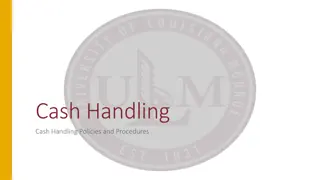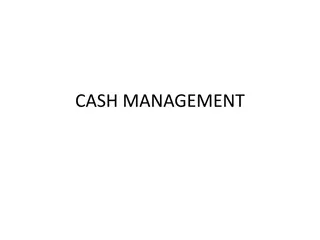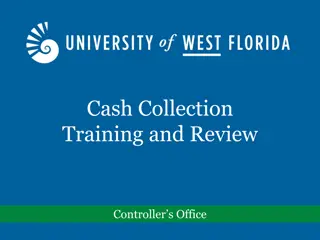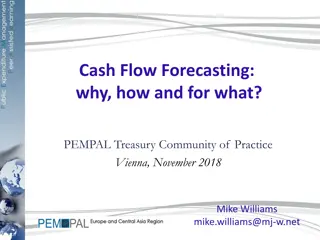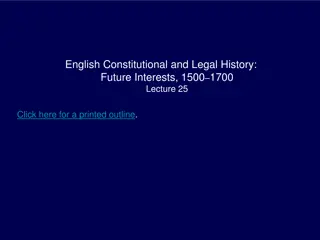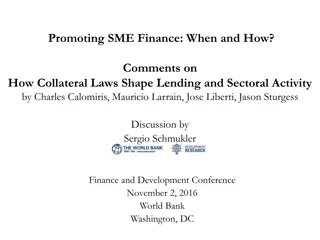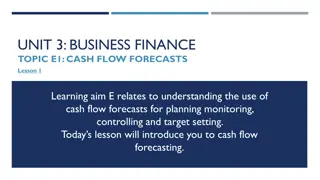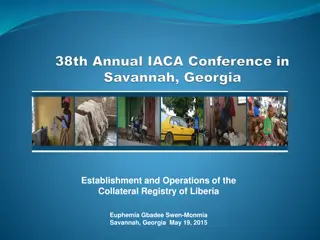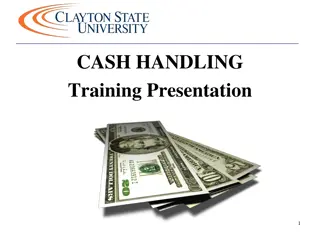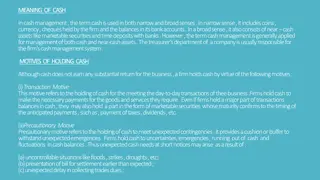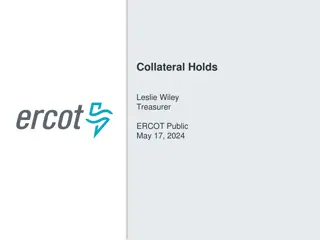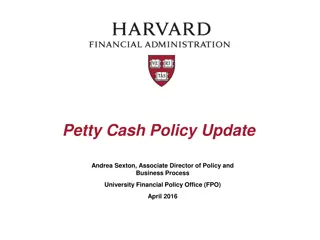Understanding Security Interests in Cash Collateral Under English Law
Explore security interests in cash collateral according to English law, including possible security interests, perfection requirements, when cash collateral arrangements fall within FCARs, and the concept of possession or control in such arrangements.
Download Presentation

Please find below an Image/Link to download the presentation.
The content on the website is provided AS IS for your information and personal use only. It may not be sold, licensed, or shared on other websites without obtaining consent from the author. Download presentation by click this link. If you encounter any issues during the download, it is possible that the publisher has removed the file from their server.
E N D
Presentation Transcript
SECURITY INTERESTS IN CASH COLLATERAL Professor Louise Gullifer
POSSIBLE SECURITY INTERESTS OVER CASH COLLATERAL UNDER ENGLISH LAW Cash = money in an account with Bank A held by borrower B Possible security interests Mortgage in favour of lender C Legal mortgage: money transferred into an account in name of lender C at Bank A OR borrower B makes a statutory assignment of right against Bank A to lender C. Bank A notified of assignment and must be of whole debt. Equitable mortgage: borrower makes an equitable assignment of right against Bank A to lender C Charge in favour of lender C Fixed charge: account must be blocked Floating charge Title transfer collateral arrangement Money transferred into account in name of lender C at Bank A Personal obligation to return equivalent collateral Charge in favour of Bank A Charge-back
PERFECTION OF SECURITY INTERESTS IN CASH COLLATERAL All charges (including mortgages) must be registered in order to avoid sanction of invalidity (s.859A, 859H Companies Act 2006) UNLESS Exempted by other legislation (here Financial Collateral Arrangements (No 2) Regulations (FCARs) Not clear on wording of s.859A - H whether charge that falls within FCARs CAN be registered. True title transfer arrangements are not charges and need not be registered
WHEN DO CASH COLLATERAL ARRANGEMENTS FALL WITHIN THE FCARS? security financial collateral arrangement Purpose to secure financial obligations owed to collateral taker Obligations secured by a security interest any legal or equitable interest or any right in security, other than a title transfer financial collateral arrangement, created or otherwise arising by way of security Expressly includes pledge, lien, mortgage and charge. Limited to where the cash is delivered, transferred, held, registered or otherwise designated so as to be in the possession or under the control of the collateral-taker or a person acting on its behalf
POSSESSION OR CONTROL: POSSESSION Any right of borrower B to withdraw excess collateral does not prevent collateral being under possession or control of lender C or Bank A possession includes where collateral is credited to an account in the name of the collateral taker, but only where the collateral provider s rights are limited to the right of substitution or withdrawal of excess collateral There will be possession if: Legal mortgage where money transferred into an account in name of lender C at Bank A (unless borrower B has more rights than to withdraw excess collateral) What is meant by excess collateral ?
POSSESSION OR CONTROL: CONTROL Negative control required: positive control not enough Directive only applies where there is dispossession (preamble art 10) Authority (Gray v GTP Group Limited [2010] EWHC 1772 (Ch), In the Matter of Lehman Brothers International (Europe) [2012] EWHC 2997 (Ch)) Negative control = collateral provider cannot withdraw money from account without permission of collateral taker Positive control = collateral taker can take or dispose of the collateral without any further involvement of the collateral provider Practical control not enough; must be legal control Probably legal control not enough; no dispossession if not practical control
POSSESSION OR CONTROL: CONTROL Control if: Legal mortgage by statutory assignment of right against Bank A to lender C. Practical control as Bank A must be notified of assignment Equitable mortgage by equitable assignment of right against Bank A to lender C IF bank A notified (would then only be equitable assignment if of part of debt) Fixed charge if account blocked and Bank A notified of this Floating charge if only right borrower B has is to withdraw excess collateral Charge-back if borrower B not permitted to withdraw money except excess collateral
DIFFERENCES FROM UCC/PPSA Under UCC/PPSA Control is positive control No need to examine rights of borrower B Control where Account in name of lender C Control agreement with Bank A (not just notification) Charge-back
PRIORITY First in time Exceptions: Dearle v Hall (Bona fide purchaser of legal interest without notice) Later fixed charge has priority over floating charge unless knows of negative pledge clause
EXAMPLE 2 SP1: is charge over bank account fixed or floating? If floating, does it contain a negative pledge clause? Presume registered (and negative pledge clause box ticked?) SP2 Does SP2 check the register? If so, will have notice of SP1 s charge and will take subject to it UNLESS SP1 charge floating and no registration of negative pledge clause If SP2 does not check the register unclear if has constructive notice if SP2 s charge not registrable If SP2 is Bank A can rely on set-off (as in Canada pre-Drummond) unless SP1 has given Bank A notice of charge before set-off arose If charge is floating, both crystallisation of charge happened AND notice of crystallisation given before set-off arose
EXAMPLE 3 SP s retention of title interest in inventory will be valid, but SP will have no interest in proceeds as if the agreement is silent as to proceeds of sale, the court will hold that the sale was on the buyer s account, If the agreement gives the seller an interest in the proceeds it will be characterised as a registrable charge and is very unlikely to be registered If SP does register charge over proceeds, analysis same as before




